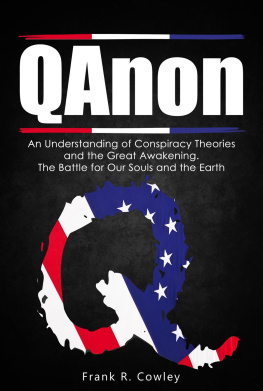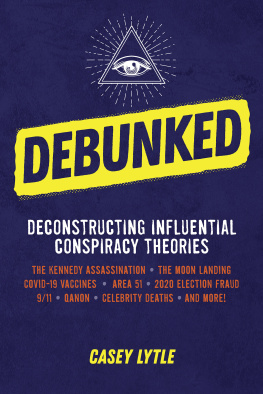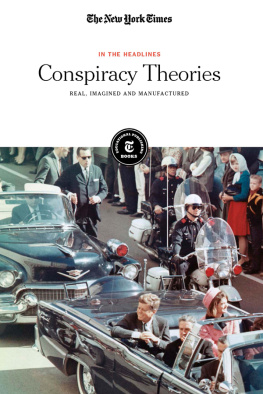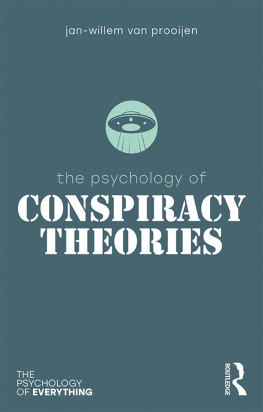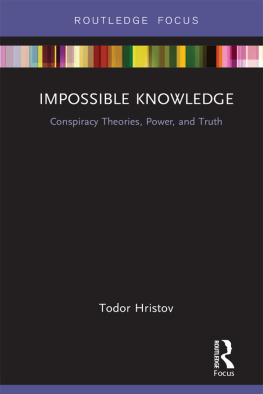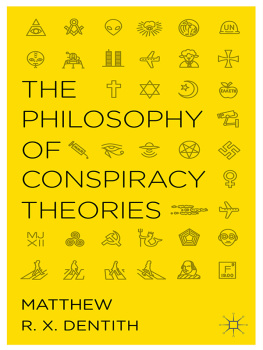
Series Title
Introducing Politys new series:
little books that make you THINK.
- Quassim Cassam, Conspiracy Theories
- Stephen Mumford, Football
- Shannon Sullivan, White Privilege
Conspiracy Theories
Quassim Cassam
Polity
Copyright page
Copyright Quassim Cassam 2019
The right of Quassim Cassam to be identified as Author of this Work has been asserted in accordance with the UK Copyright, Designs and Patents Act 1988.
First published in 2019 by Polity Press
Polity Press
65 Bridge Street
Cambridge CB2 1UR, UK
Polity Press
101 Station Landing
Suite 300
Medford, MA 02155, USA
All rights reserved. Except for the quotation of short passages for the purpose of criticism and review, no part of this publication may be reproduced, stored in a retrieval system or transmitted, in any form or by any means, electronic, mechanical, photocopying, recording or otherwise, without the prior permission of the publisher.
ISBN-13: 978-1-5095-3582-8
ISBN-13: 978-1-5095-3583-5(pb)
A catalogue record for this book is available from the British Library.
Library of Congress Cataloging-in-Publication Data
Names: Cassam, Quassim, author.
Title: Conspiracy theories / Quassim Cassam.
Description: Cambridge, UK ; Medford, MA : Polity Press, [2019] | Series: Think
Identifiers: LCCN 2019008492 (print) | LCCN 2019010406 (ebook) | ISBN 9781509535842 (Epub) | ISBN 9781509535828 (hardback) | ISBN 9781509535835 (pbk.)
Subjects: LCSH: Conspiracy theories.
Classification: LCC HV6275 (ebook) | LCC HV6275 .C36 2019 (print) | DDC 001.9--dc23
LC record available at https://lccn.loc.gov/2019008492
Typeset in 11 on 15 Sabon
by Fakenham Prepress Solutions, Fakenham, Norfolk, NR21 8NL
Printed and bound in Great Britain by CPI Group (UK) Ltd, Croydon
The publisher has used its best endeavours to ensure that the URLs for external websites referred to in this book are correct and active at the time of going to press. However, the publisher has no responsibility for the websites and can make no guarantee that a site will remain live or that the content is or will remain appropriate.
Every effort has been made to trace all copyright holders, but if any have been overlooked the publisher will be pleased to include any necessary credits in any subsequent reprint or edition.
For further information on Polity, visit our website: politybooks.com
Preface
Back in 2015, in an article for the digital magazine Aeon, I discussed the intellectual character of conspiracy theorists. I was influenced by Susan Stebbings famous observation that there is an urgent need today for the citizens of a democracy to think well. My idea in the Aeon article was that conspiracy theories were often the result of bad thinking and of the intellectual character traits that result in bad thinking.
Since the publication of my Aeon article, my take on conspiracy theories has changed. I have come around to the view that they need to be understood first and foremost in political terms, and that the intellectual character of conspiracy theorists is a side issue. For example, even if there is something wrong with the thinking behind conspiracy theories about the Holocaust, that is hardly the main issue with such theories and the people who promote them. The fundamental issues here are political and, indeed, ethical.
This book is about the politics of conspiracy theories. My claim is that they are basically a form of political propaganda and that the response to them also needs to be political. Although Im a philosopher, it seems to me that many philosophers who write about conspiracy theories miss their real point. I have tried to put that right here.
I know from previous experience that criticising conspiracy theories and conspiracy theorists is a tricky business. The reaction to my Aeon article was explosive and I dont suppose that what I say in this book will be any more palatable to conspiracy theorists and their apologists. I hope I am better prepared this time. To write about conspiracy theories you need a thick skin, unless you are actually promoting a conspiracy theory.
I thank Pascal Porcheron for persuading to me write this book and for very helpful comments on earlier drafts. I also thank Naomi Eilan and Deborah Ghate for many other helpful comments and discussions.
The (Real) Point of Conspiracy Theories
Conspiracy theorists get a seriously bad press. Gullible, irresponsible, paranoid, stupid. These are some of the politer labels applied to them, usually by establishment figures who arent averse to promoting their own conspiracy theories when it suits them. President George W. Bush denounced outrageous conspiracy theories about 9/11 while his own administration was busy promoting the outrageous conspiracy theory that Iraq was behind 9/11, in cahoots with Al Qaeda.
If the abuse isnt bad enough, conspiracy theorists now have the dubious privilege of being studied by psychologists. The psychology of conspiracy theories is a thing, and the news for conspiracy theorists isnt good. A recent study describes their theories as corrosive to societal and individual well-being. Conspiracy theorists, the study reveals, are more likely to be male, unmarried, and less educated, to have lower household incomes, and to see themselves as being of low social standing. They have lower levels of physical and psychological well-being and are more likely to meet the criteria for having a psychiatric disorder.
In case youre starting to feel sorry for conspiracy theorists (or for yourself, if you are one), perhaps its worth remembering that they arent exactly shrinking violets. They are vociferous defenders of their theories and scornful of their opponents. Anyone who has been on the receiving end of the wrath of conspiracy theorists will know that it can be a bruising experience. I have the honour of being described by one eminent (if thats the right word) conspiracy theorist and fellow philosopher as a bona fide anti-conspiracy buffoon.
And yet, on reflection, you might wonder what all the fuss is about. After all, if a conspiracy theorist is someone who believes in the existence of some conspiracies, then surely in that sense we are all conspiracy theorists. History is full of well-documented conspiracies and one would have to be remarkably ignorant not to realise that. Michael Moore once said that he wasnt into conspiracy theories except the ones that are true. Realistically, isnt that actually the position were all in? Surely what we should be debating is not whether there is anything wrong with conspiracy theories per se, but whether there is anything wrong with specific conspiracy theories.
According to the 9/11 conspiracy theorist James Fetzer (thats the guy who thinks Im an anti-conspiracy buffoon), for something to qualify as a conspiracy, it only requires two or more people who collaborate to perpetrate an illegal act. There are a couple of important things missing from this definition: conspiracies are supposed to be secret and, because of that, they involve a small group of people the conspirators. A conspiracy requires a small group of conspirators who work together in secret to do something illegal or harmful.
This is the sense of conspiracy according to which history has always been full of conspiracies. Suppose that a conspiracy theory is defined as a theory about a conspiracy. In that case, history books are full of conspiracy theories. They tell us, for example, that Guy Fawkes and his colleagues plotted to blow up the English parliament in 1605. The plot was a conspiracy by Fetzers definition and mine, and historical accounts of the plot are therefore conspiracy theories.
Next page
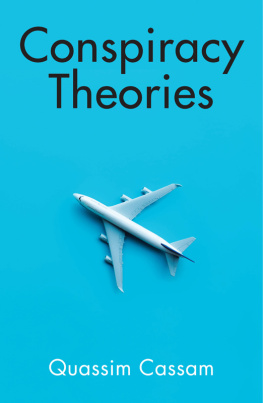

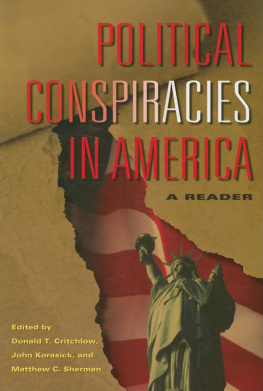
![Christopher R. Fee - Conspiracies and Conspiracy Theories in American History [2 Volumes]](/uploads/posts/book/429085/thumbs/christopher-r-fee-conspiracies-and-conspiracy.jpg)
